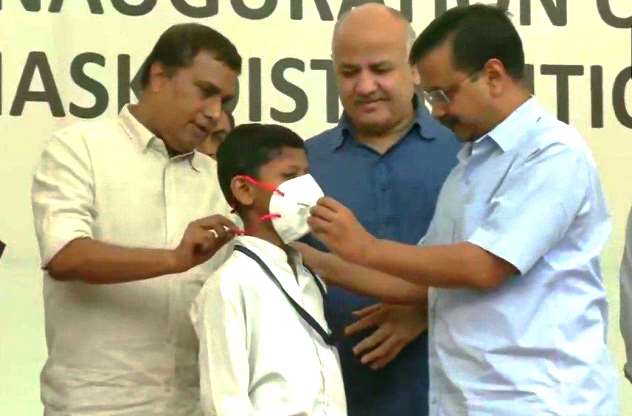
Delhi Shows How NOT To Manage A Pandemic
Unlock 1.0 in Delhi, with the opening of borders, has led to huge mobility and activity, even while the markets have reopened and people are trying to recapture their outdoor lives after weeks of depressing quarantine in lockdown. The renewed presence of people outside on the streets and partial commercial activity have seen a simultaneous rise in Covid-19 cases across the National Capital. With 50,000 plus cases, and around 2,000 deaths, deputy Chief Minister Manish Sisodia has given a stern warning that by June-end there might be 1,00,000 cases in Delhi alone, and by the end of July perhaps as many as 5,00,000 cases. This is a grim and dire prediction signifying that post-lockdown the virus has spread across the spectrum, and so drastically, while the official health and hospital system seem to be cracking under the burden.
The news that the Delhi health minister has been infected and is critically ill is bad news, and one wishes him a speedy recovery. Earlier several doctors and health workers in leading hospitals like AIIMS had fallen ill, even while the stark lack of PPEs and gas masks, including ventilators and oxygen, had only made the situation more tragic and tense. Nurses have been resigning en masse from both private and government hospitals and the acute lack of beds, for those patients who have tested positive, has been all apparent.
There have been reports of people running from pillar to post to get themselves tested since the doctors and the hospitals refuse to admit patients, and the usual bureaucratic structures in government hospitals have not helped. Indeed, besides education and the successful experiment of ‘mohalla clinics’, the Delhi government was much appreciated for its stellar work in the health sector, while they made all kinds of tests and treatment totally free for the citizens of Delhi.
ALSO READ: ‘Doctors Giving Their Best, Public Support Vital’
This presumably strong edifice seems to have cracked under the pressure of the pandemic, with both the state and the Centre having caught off-guard and the health structures under great stress. Indeed, the prestigious hospitals in Delhi under the central government and the Union health minister too are under severe stress, even as they handle the pressure from patients from other states with crumbling or weak health infrastructures, as in Uttar Pradesh and Bihar.
What has been really disturbing is the manner in which some private hospitals and health care institutions in Delhi have chosen to behave. They are reportedly charging huge sums, often in lakhs, from patients, thereby shutting the door to those patients who don’t have deep pockets, and parasiting on those who just don’t have any option in a desperate situation with government hospitals denying them admission, treatment or testing facilities. There was a case of an elderly asthmatic patient who was shunted from one hospital to another, both private and government, to the extent that the man died on the streets outside one hospital, with his family begging to the doctors who simply refused treatment.
Besides, what about those patients who are suffering from other ailments — cancer, tuberculosis, heart diseases, etc? With OPDS practically shut, private clinics dysfunctional, and doctors refusing to come home, where do they go for treatment or a check-up?
Why can’t private hospitals in Delhi be put in line with a government order asking them to admit and treat all critical patients, come what may, and not charge a penny extra, as Mamata Banerjee has ordered in Bengal, and as was the norm in Kerala? What stops the central government to issue a directive to all private hospitals not to fleece patients and treat all them without exploitation and with dignity in a national crisis?
ALSO READ: ‘Choked Toilets, Smelly Linen, Quarantine Is Jail’
Besides, overworked doctors and nurses and health staff, have had their professional lives stretched to the ultimate limits, even while they risk their lives as frontline workers to fight the epidemic. Besides asking people to beat ‘thalis’ etc in praise, the central government does not seem have had any intention to give them benefits or incentives to boost their morale in such difficult work conditions. Most doctors and health staff thereby have been left to their own fate.
Besides, the central government seems to have turned a blind eye to the massive crisis since January this year, and this transparent indifference and insensitivity only continued with the tragic migration of lakhs of workers, their wives and children, starving, thirsty, emaciated and totally helpless. Thereby, no one really knows what the state of affairs of the tens of thousands of workers is who have reached their homes in small towns and villages. These places so brazenly lack even the most basic health structures, with even the primary health or community centres absent, and the district hospitals in dire straits. This seems to be a pattern in the Hindi heartland, especially in UP and Bihar. More so, around 25 lakh workers are reportedly now in transit or quarantine.
WATCH: ‘No Money, No Food, No Work’
The good news is that the Delhi government has promised another 15,000 beds by June 30. Recently, Chief Minister Arvind Kejriwal visited the Radhasoami Satsang Beas in South Delhi’s Chhatarpur. The Delhi government is creating a makeshift Covid-19 health care facility with 10,000 beds in a vast open area, which will be centrally air-conditioned and fully equipped. Besides, the Delhi Disaster Management Authority (DDMA) has urged the central government to provide 2,000 health care officials from the army and security services, including doctors and nurses; they should be allowed to work in this huge, temporary hospital.
“This 10,000-bed facility should be ready for admission of Covid-19 patients by the first week of July. It will primarily cater to patients with mild or no symptoms who cannot be assigned home quarantine for some reason and may need medical intervention. It will be our biggest, dedicated Covid health centre,” Kejriwal said.
This is indeed a positive move in a context that till now India has had been lucky not to face a situation as rampant in the USA, or as in Brazil. With indications and fear that the virus will peak in the days to come, and with the lockdown decisively lifted, including on train and air travel, it will be a tight-rope walk for both citizens and the governments. And Delhi being the capital will have to really pull up all its resources, talent, commitment and infrastructure, so that people do not suffer and the pandemic can be controlled.



